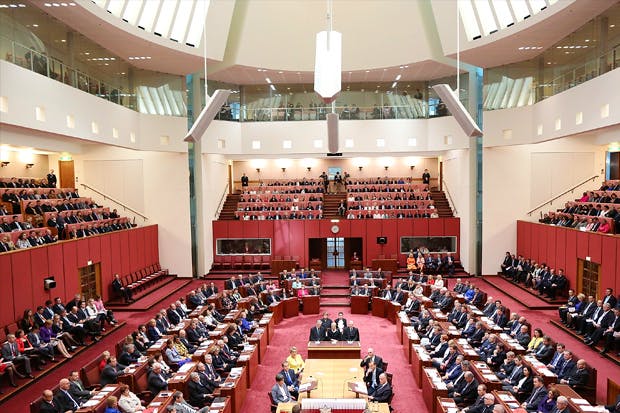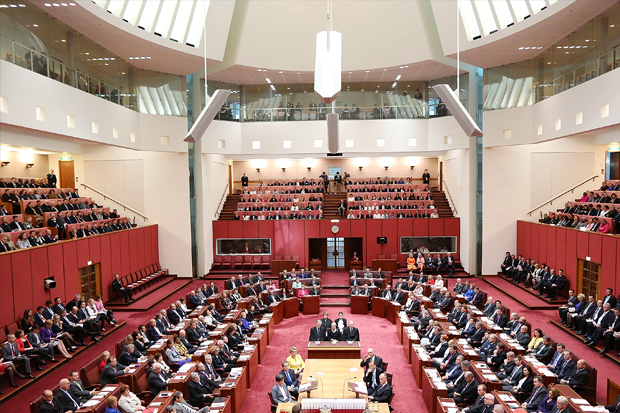If the Senate votes down the same sex marriage plebiscite bill it will amount to one of the most undemocratic acts by the Senate in Australian history. The accepted conceptual and historical role of the Senate is and has always been either that of a ‘States’ house’ (where senators represent the interests of their State) or as house of review (where the Senate performs a more free-ranging and constructive role of vetting bills passed by the House of Representatives), or a combination of both. Yet neither of those functions will have been fulfilled if the Senate votes down the plebiscite bill.
Clearly there is no perceivable state –based interest attaching to the question of same sex marriage or the legal procedure by which it is delivered. In voting against the plebiscite bill no senator can argue that he or she is protecting particular concerns of constituents specifically or solely relevant to his or her state. More importantly, there is no review function being performed. That is because the proposed plebiscite law is merely procedural. It is an enabler which will require the people, in an act of direct democracy, to decide a question about the substantive law; namely the proposed amendment to the Marriage Act.
During the Federal Convention Debates of the 1890s questions relating to the role of the Senate and the power it should be afforded occupied a third of the total time spent debating the content of our Constitution. For our founding fathers it was by far the most pressing issue. Most Convention participants desired a system of representative and responsible government fashioned in full Westminster tradition. Yet pulling together six disparate self-governing colonies into a new nation state necessitated a bicameral parliament which would preserve the independence of the colonies. The big debates were not about whether we should have an upper house, but rather its role and how much power it should have. Should it function as a States’ house, or as a more general house of review? What power of veto should it have? A States’ house which was no more than a rubber stamp for the so called ‘People’s house’ (where governments would be formed) would weaken and ultimately threaten the federal compact. On the other hand, a Senate with a full power of veto was bound to result in parliamentary deadlock. When the founders finally resolved that (apart from an adjustment of rules for money bills) the legislative power of both houses should be the same, there was widespread concern that the Senate may have been afforded too much power. But it was an unavoidable compromise. In the end, the founders had no choice but to place faith in the common sense of future parliamentarians to make the system work.
On 28 October 1916, a young nation conducted its first plebiscite. Despite having the power to enact a law to compulsorily send young Australian men to fight in a foreign land, the government asked the people for permission. While the substantive question prompted a divisive national debate, there were no real concerns about the legitimacy of the plebiscite, or the one that followed in 1917.
Fast forward exactly one hundred years. In Australia the same sex marriage debate has been on the agenda for a decade. Previous attempts to introduce same sex marriage have failed. In every comparable democracy around the world, same sex marriage has been delivered through either the courts, parliaments or the people.
A new coalition government has been re-elected with a clear policy to address the issue by conducting a plebiscite. The policy, like our Constitution, was forged by compromise – this time on the conservative side of politics, where there are competing views about same sex marriage. However, the coalition representatives accept that the matter should be resolved. Most believe, and polls confirm, that the Australian people would vote to approve same sex marriage. On the basis that a significant social question of this kind is an appropriate question for the people, a majority of elected representatives in the coalition parties favour the plebiscite as a mechanism for change. Despite the ferocious campaign against it, the plebiscite has support across the political divide, including from within parts of the LGBTI community.
With that history, we could expect that the people will be voting on same sex marriage via a national plebiscite on February 11th next year. But it appears not to be.
Labor and the Greens cannot countenance same sex marriage being ushered in by a conservative government. Once again, the crossbench senators are left holding the cards. And despite having no mandate or genuine role to perform, some of them are set to stop the national plebiscite in its tracks.
Take Nick Xenophon, who leads the crucial block of three senators from South Australia. Despite rushing to give the plebiscite support when it was first announced by the Abbott government, Xenophon now says he will not vote for it. His Nick Xenophon Team took no position on the plebiscite to the election. The people of South Australia have no distinct interest in the plebiscite process or its result. There is no substantive law for NXT to review; merely a law which enables the question to go to the people.
Among the Convention debaters in the 1890s, there were progressives, conservatives, activists, reformers, optimists, pessimists, theorists and pragmatists. Collectively transported into the twenty-first century they would likely reflect the full gamut of contemporary views around same sex marriage. But they would be dismayed to witness senators set to assume a role in preventing a majority government from conducting a national plebiscite. They would think this was an affront to the democratic institutions they designed.
A government, even with the strongest representative traditions, is entitled from time to time to ask the people a special question. The Senate simply has no business standing in the way.
Got something to add? Join the discussion and comment below.
Get 10 issues for just $10
Subscribe to The Spectator Australia today for the next 10 magazine issues, plus full online access, for just $10.














Comments
Don't miss out
Join the conversation with other Spectator Australia readers. Subscribe to leave a comment.
SUBSCRIBEAlready a subscriber? Log in